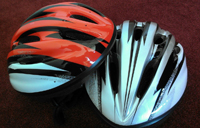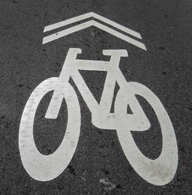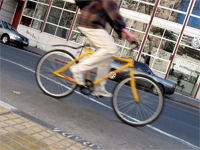Posts by Breakstone, White & Gluck
Attorney David White to Speak at Boston Cycling and Health Expo about Insurance for Cyclists

Attorney David W. White of Breakstone, White & Gluck will speak this weekend about how cyclists can purchase accident coverage to protect themselves from injuries and lost wages. White will speak at the Boston Cycling and Health Expo at 12:30 p.m. Saturday at the Westin Boston Waterfront. His talk is free and open to the public.
Cyclists often ride around with small amounts of coverage because they are unaware of how easy and relatively affordable it is to purchase extra coverage through their Massachusetts auto insurance policies. Drivers in Massachusetts are required to carry auto insurance, but they often carry very little and in some cases, none at all. If a cyclist is hit by a driver with inadequate insurance, he or she may be left without the compensation that is needed to fully recover and pay for medical expenses, bills, and the physical injuries.
White will talk about two ways cyclists can protect themselves by:
- Purchasing adequate amounts of Underinsured and Uninsured Motorist coverage
- Purchasing adequate Medical Payments coverage
Want to learn more before the event? Read our article, What Every Massachusetts Bicyclist Needs to Know About Car Insurance.
White will review the key parts of a Massachusetts auto insurance policy and explain the different options for cyclists to obtain compensation for injuries, including their own health insurance and no fault benefits. He will also discuss medical liens that health insurance companies may place on a personal injury case.
Cyclists who do not own cars may still be able to benefit from coverage if they live in a household with a car.
About Attorney David W. White
White is a Boston personal injury lawyer who has specialized in bicycle accident cases for over 25 years. He is a past president of the Massachusetts Bar Association. He is a frequent lecturer at continuing legal education programs and other events.
About the Boston Cycling and Health Expo and MassBike Bike Night
The Boston Cycling and Health Expo begins Friday and will host vendors from throughout New England who offer cycling, sports equipment and services aimed at healthy living. It starts at 2 p.m. Friday at the Westin Boston Waterfront at 425 Summer Street. It is also open Saturday from 9 a.m. to 5 p.m. Two notable events: MassBike will host its Bike Night and Fashion Show on Friday, starting at 6:30 p.m. Then on Saturday, the expo will start with a group bike ride around the City of Boston.
Breakstone, White & Gluck Booth
Breakstone, White & Gluck will have a booth and we invite you to stop by. Our lawyers and staff will be demonstrating how to use the firm’s new Boston cycling app. The smart phone app provides users with safety tips from our lawyers, an easy way to store your health insurance information and tools to gather information at the scene if you are in an accident. We will also be sharing pictures from our work donating youth bike helmets to Boston Bikes, Cycle Kids, Bikes Not Bombs and other organizations this spring. Learn more.
Bike Helmets in Boston
 If you were in Boston last week, there is a good chance you saw a few cyclists. It was Bay State Bike Week and cyclists came out strong for events and group rides.
If you were in Boston last week, there is a good chance you saw a few cyclists. It was Bay State Bike Week and cyclists came out strong for events and group rides.
While many cyclists were wearing helmets, a new report says not all are. According to the City of Boston Cyclist Safety Report, from 2009 to 2012, cyclists were wearing helmets in less than 50 percent of incidents responded to by Boston Emergency Medical Services (Boston EMS).
Women wore helmets in 60 percent of incidents while men wore them in 43 percent.
Overall, the city reports 72 percent of cyclists citywide are wearing helmets.
Cyclists who wear bike helmets reduce their risk of head injury in a cycling accident by as much as 85 percent and the risk of brain injury by as much as 88 percent, according to the National Highway Traffic Safety Administration.
The city’s report shows bike accidents in Boston have increased from 2010 to 2012. The Boston Police Department reports a 2 percent increase while Boston EMS reports 9 percent. Nine cyclists died in accidents, including five in 2012. Ridership has also increased over this time as the city expanded infrastructure and launched the Hubway bike share program, making hundreds of new bikes available for short-term rentals.
Boston Bikes (the office which manages the city’s bike programs) reported a 16-28 percent increase in bike trips over that period. In the city’s report, Mayor Thomas Menino has pledged to decrease the cyclist crash injury rate by 50 percent by 2020.
Bike Helmets in Boston
In Massachusetts, cyclists who are 16 years of age or younger must wear helmets while riding bicycles, under M.G.L. c.85 Section 11B. The helmet must be secured to the cyclist’s head with straps and meet standards established by the U.S. Consumer Product Safety Commission.
But they are important for cyclists of all ages. The Boston cyclist safety report, which was produced by a number of city offices, has a long-term goal of passing a law requiring cyclists of all ages to wear helmets in Boston.
The city has tried to make discount helmets available to riders, launched a $40,000 “Wear a Helmet” advertising campaign promoting helmet usage and plans to install helmet vending machines at Hubway bike share stations. It also stresses helmet usage through its community programming.
In addition, Hubway riders agree to wear helmets as part of their rental agreement. But a study last year revealed many riders are not holding up their end of the deal. In the study, researchers at Beth Israel Deaconess Medical Center reported 80 percent of bike-share users in Boston and Washington D.C. were not wearing bike helmets. By contrast, riders who owned their own bike wore their helmets about half the time.
The study’s author wrote that head injury accounts for about one third of all bicycle injuries and about three-quarters of all bicycle-related deaths.
Bike Helmet Law for Boston?
Boston was one of the first cities in the country to offer bike sharing. It would be leading the way again if it passed a law requiring cyclists of all ages to wear helmets. Massachusetts, the District of Columbia and 21 other states require cyclists under 16 to wear helmets, but there are no states which mandate use by adults, according to the Insurance Institute for Highway Safety.
There are other cities and towns with laws or ordinances requiring helmets be worn by cyclists of all ages, including Dallas, Texas and Sykesville, Maryland. There is a bill proposed in the Legislature to make Maryland the first state to require cyclists of all ages to wear helmets.
In Washington State, more than two dozen communities have laws or ordinances requiring helmets to be worn by all ages, but there is no statewide law.
Breakstone, White & Gluck Donates 750 Bike Helmets to Youth Programs in Boston
BOSTON, MA – May 16, 2013 – Breakstone, White & Gluck, P.C., announced today that it will donate 750 bicycle helmets to youth in the Boston area, through programs in Boston, Somerville, Cambridge and Dedham.
Attorney David W. White, a member of the firm, said, “We are always looking for ways to give back to the community. This spring we are focusing on preventing head injuries in children by donating helmets where they are needed.”
The firm will donate helmets this spring and summer through these programs: Mayor Menino’s Boston Bikes Roll It Forward program; CYCLE Kids of Cambridge; the Winter Hill Community School in Somerville; the Dedham Bike Rodeo and Bikes Not Bombs of Jamaica Plain.
White said, “This is the first year of our project, and we look forward to expanding it significantly in years to come. Awareness of head injury prevention is critical for the health of our children. We hope that our helmet distribution will help increase safety awareness and prevent injuries.”
Read more about the bicycle safety programs our law firm will support this year.
Bike Month: Time for Massachusetts to Think About Safety
 This is National Bike Month, when cyclists gather for events and rides all over the country. In Massachusetts, the busiest time is during Bay State Bike Week, which began last weekend. Cyclists from Boston to Springfield to Cape Cod are being encouraged to pedal to and from work in the name of fitness and reducing traffic congestion on the roads.
This is National Bike Month, when cyclists gather for events and rides all over the country. In Massachusetts, the busiest time is during Bay State Bike Week, which began last weekend. Cyclists from Boston to Springfield to Cape Cod are being encouraged to pedal to and from work in the name of fitness and reducing traffic congestion on the roads.
But along with the fun, Bike Month is a time to ask ourselves and lawmakers if we can make the roads safer to prevent personal injury to bicyclists.
While Boston has been called a world-class cycling city in recent years, safety advocates say we can do better. This month, the League of American Bicyclists dropped the state’s ranking from third to sixth in its 2013 Bicycle Friendly State Rankings, offering these and other suggestions to state officials:
Safe Passing Law. Adopt a safe passing law with a minimum distance of three feet to address bicycle safety.
Vulnerable Road User. Adopt a vulnerable road user law that increases penalties for motorists that injuries or kill bicyclists or pedestrians.
Cell Phone Ban for Drivers. Pass a cell phone ban for all drivers. Currently, Massachusetts bans all drivers from texting while driving but only bans drivers under 18 from talking on their cell phones and driving.
Bicycle Riders Manual. Create a statewide bicycle riders manual with laws, state bike routes and laws for cyclists.
MassBike, the state’s leading advocacy group for cyclists, has been seeking passage of a vulnerable road users bill that increases penalties for drivers who injure or kill a bicyclist or others defined as a vulnerable road user. MassBike first filed a bill with the Massachusetts Legislature in 2011 and refiled a few months ago for the start of the new legislative session.
Under the bill, drivers found guilty of crimes such as motor vehicle homicide or hurting or killing a person while driving drunk would face double the normal fines if the victim is considered a vulnerable road user.
The bill defines vulnerable road users as “a pedestrian or a person operating a bicycle, handcycle, tricycle, skateboard, roller skates, in-line skates, wheelchair, non-motorized scooter or any non-motorized vehicle, or a person riding a horse.”
Additionally, the bill would require violators to take a traffic class and perform 100 hours of community service related to road safety. There would be special penalties for drivers who harass vulnerable users with their vehicles. Meanwhile, victims would be given guidelines for filing civil lawsuits against drivers who assault or threaten them.
Another bill proposed by MassBike is the Bicycle Lane Bill, which would make it a violation for a car to park or stand in a marked bike lane. Boston and some other communities have bans, but MassBike seeks a statewide ban.
Read about other bills filed and supported by MassBike.
Texting While Driving Study: Voice-to-Text is Not Safer

We all have one: a cell phone we keep close by throughout the day, to keep in touch with work and the people in our lives. Many of us now use smart phones so in addition to talking and texting, we have quick access to apps, cameras and other neat gadgets. The bottom line is we get more use from our mobile phones now than ever.
While the conveniences are nice, they are a negative when it comes to driving. Studies have long shown cell phone use of any type is a distraction which can result in drivers taking their eyes off the road and causing motor vehicle accidents.
Most states have some restriction on use. The District of Columbia and 39 states, including Massachusetts, ban texting while driving. Ten states and the District of Columbia ban all phone use by drivers. Massachusetts bans all cell phone use for drivers under 18.
Some say these efforts and related educational campaigns are falling short and the use of smart phones is actually increasing. The market has certainly grown dramatically. By last October, the count was over 1 billion smart phone users worldwide, according to one firm’s report. By 2015, another billion users are expected to get smart phones.
Many new users are using talk-to-text technology while they drive, but a new study finds this is not actually any safer. The study by the Texas A&M Transportation Institute was released during April’s National Distracted Driving Awareness Month. The study was the first to compare voice-to-text and manual texting.
The Study
The transportation institute studied 43 research participants driving a vehicle on a closed course. Drivers traveled the course without any cell phone use, then three more times performing texting exercises. On the first two laps, they used two different voice-to-text applications. On the third lap, they texted manually.
Researchers found driver response was significantly delayed when drivers used voice-to-text or sent text messages. In both cases, drivers took about twice as long to react as they did when they were not texting.
Manual texting required slightly less time than voice-to-text, but driver performance was roughly the same.
One theory for why is drivers who used voice-to-text had to look down at the phone after they spoke their message and check it before sending, taking their attention from the road.
Massachusetts Texting While Driving Law
The Massachusetts law which bans texting while driving is M.G.L. c. 90, Sec. 13B. It took effect Sept. 30, 2010.
Under the law, drivers in Massachusetts are banned from both texting and e-mailing while operating a car. They cannot read or browse the Internet. Voice-to-texting is not specifically addressed in the law.
Some police departments are seeking to enforce the law. In January, West Bridgewater police stopped 51 drivers over four hours on a Saturday afternoon. In March, another four-hour sting caught 43 drivers texting.
Texting while driving is a non-criminal offense which carries a $100 for the first offense, $250 for the second offense and $500 for the third.
Drivers who are texting and driving and cause injury or death can also be criminally charged under M.G.L. c. 90, Sec. 24(2)(a). Read about a recent case.
Housing Code Violations and Over-Crowding in Boston Student Housing
The fire on April 26, 2013 at 87 Linden Street in Allston, the second serious fire in less than two years on the same block, is a tragic reminder of what can happen with overcrowded, substandard student housing.
The Fire Marshall will now investigate the cause of the Allston fire. In addition, The Boston Inspectional Services Division should examine whether the unit was overcrowded in violation of the Boston Zoning Ordinance, and whether housing codes and accessibility codes were violated. Enforcement of city ordinances is, unfortunately, inconsistent, and usually after the fact. Knowing this, landlords and realty companies frequently violate these ordinances in the name of profits. The victims are often unsuspecting college students. As a result, students, who pay high rents, are subjected to increased risks from their overcrowded housing.
The law in Massachusetts governs how homes must be safely maintained in order to prevent personal injury to occupants of the property. In Boston, zoning ordinances require building owners to declare whether their properties are single-family or multi-family units. In either case, under Boston’s zoning ordinances, under the definition of “family,” no unit may be occupied by more than four unrelated students unless the building meets much stricter building requirements.
It is also generally illegal for a landlord to create bedrooms in basements, and it may be against code to create a bedroom in an attic. No matter how it is configured, every house or apartment must have working smoke detectors throughout the unit.
Once a unit exceeds the four unrelated-occupant threshold, it technically becomes a rooming house, which makes it subject to very strict fire-prevention regulations under M.G.L. c. 148, Sec. 26I and other regulations. For example, a rooming house must have walls and ceilings made from fire-rated materials to slow flames in the event of a fire. Smoke detectors must be in every bedroom,
and must be interconnected. Even more important, every boarding house must have a working sprinkler system. Boarding houses must also meet accessibility guideline and provide multiple means of egress for upper floors, which may include fire escapes.
Real estate brokers and leasing agents share responsibility for student overcrowding and exposure to risk from substandard housing. A quick look at any leasing agent’s website will reveal scores of units available for student occupancy which are intended to house more than four unrelated individuals. Leasing agents collect a single month’s rent, sometimes more, for their services. Since they also take the responsibility to collect signatures on leases, they know exactly how many students will be in the unit. Leasing agents simply cannot claim ignorance of the laws regarding overcrowding.
Who May Be Liable
It is our firm’s opinion that violations of the boarding house rules are evidence of negligence and may create liability for the responsible landlord.
We also believe that knowing and willful violations of the boarding house rules by real estate companies or leasing agents may subject them to liability as well. Violations of these standards may also be violations of the Massachusetts Consumer Protection Act, which may subject landlords and their leasing agents to multiple damages and attorneys’ fees.
Other Cases
Injuries and death from substandard housing may also lead to criminal charges against landlords. For example, in January 2012, two absentee landlords were convicted of manslaughter after a fire in an illegal apartment in Quincy led to the deaths of three tenants. The landlords were accused of wantonly violating building and fire codes.
The question of the enforceability of rooming house regulations is also pending at the Massachusetts Supreme Judicial Court. In that case, civil claims were brought against a Worcester landlord for violation of the Worcester zoning bylaw. In that city, no more than four unrelated persons can occupy a home. The city brought the violation because there were more than four students in the unit. The decision in that case is expected to be handed down in the next few weeks.
Update: The City of Boston later cited the owner of the two-family structure, Anna Belokurova, for running an illegal rooming house and not obtaining the permits needed to create bedrooms in the basement, according to The Boston Globe. Read more.
Related Articles:
Woman killed, firefighters and occupants injured in raging Allston fire, Boston Herald.
One dead, 15 injured in Allston house fire, The Boston Globe.
Jury finds landlords guilty of involuntary manslaughter in Quincy apartment fire, The Patriot Ledger.
About Breakstone, White & Gluck
Breakstone, White & Gluck of Boston has over 85 years combined experience represented injured clients in Massachusetts. If you or a loved one has been injured, learn your rights. For a free legal consultation, contact us at 800-379-1244 or 617-723-7676 or use our contact form.
Dangerous Magnet Toys Recalled by Major Retailers

The Consumer Product Safety Commission (CPSC) has moved a step closer to taking two dangerous magnet toys out of the hands of children.
On April 12, six retailers voluntarily recalled Buckyballs and Buckycubes. The stores included Barnes & Noble, Brookstone, some Hallmark stores, Marbles the Brain Store and Think Geek.
Maxfield & Oberton Holdings of New York City, the importer and distributor, refused to issue a recall last year, prompting the CPSC to file a lawsuit against the company in July to stop sales. The rare legal action – one of just four taken by the CPSC in the past 11 years – resulted in the company discontinuing its products in October. It stopped doing business in December.
The product was manufactured by Ningo Prosperous Imp. Exp. Co. Ltd. of Ningbo City in China.
Buckyballs and Buckycubes vary in size and color, but they are essentially a ball or cube of small powerful magnets. They were sold in containers of 10 to 216 magnets that can become loose. The first of the two products was introduced in the U.S. in March 2009. Since then, over three million sets of magnets have been sold in U.S. retail stores and online.
Maxfield & Oberton initially marketed Buckyballs to children, calling it “an amazing toy.” It later rebranded the magnet toys as an adult desk toy and stress reliever.
But while the magnets were being marketed to adults, the CPSC was still receiving reports that children were swallowing them. It has received 54 reports of injuries, all but one requiring medical treatment.
CPSC Complaint
The CPSC’s July 25, 2012 complaint alleged that the magnet products had defective labeling and warnings, defective design, and posed a substantial product hazard.
The CPSC began working with the company on labeling three years ago, when the magnets were labeled for use by children “Ages 13+.” The agency said the magnets should have been marketed for age 14 and up.
Maxfield & Oberton changed the labeling and agreed to a voluntary recall of 175,000 magnet toys, but the CPSC said the injuries continued. In its complaint, it states, “…labeling and warning labels cannot guard against the foreseeable misuse of the product and prevent the substantial risk of injury to children.”
Company officials did not agree with the CPSC’s action. In October, they posted a statement on their website that read in part: “We’re sad to say that Balls & Cubes have a one-way ticket to the Land-of-Awesome-Stuff-You-Should-Have-Bought-When-You-Had-the-Chance.”
Dangerous Toy
Over the past few years, the CPSC set up a Magnets Information Center on its website to educate the public about the danger of swallowing magnets.
The risk is that if a child ingests more than one of the powerful magnets, they can become attracted to each other while in the intestines, pinching tissue and damaging the intestinal walls. This can result in a wide range of symptoms, including vomiting, abdominal pain, infection and death. Surgery is often required and becomes more complicated because the magnets can stick to the metal surgical tools.
And in some cases children ingested more than one or two. CBS News reported the case of a 3-year-old Oregon girl who swallowed 37 Buckyballs. The CPSC complaint details cases of other young children who have swallowed numerous magnets.
Related:
CPSC administrative complaint
Recall information for consumers
Boston Bike Season Begins: Tips to Protect Yourself

After a long, hard winter, cyclists are finally enjoying a taste of spring weather. All across Massachusetts, bikes are being pulled out of storage, tuned up, and taken back out on the road.
Boston celebrates the return of the nation’s premier bike-sharing program, Hubway, which is celebrating its third season in town. The program has now expanded from Boston to Cambridge, Somerville and Brookline. And today, to celebrate opening day for the Red Sox, Hubway is having a Rolling Celebration ride through the cities.
If you are a Massachusetts bicyclist, now is a good time to review some important rules and regulations, as well as some important insurance tips:
Roads. You can travel on the side of the road or in the middle of the lane. Up to two cyclists can ride abreast in a lane. Many communities also offer designated bike lanes and shared lanes. Turns to the left can, and should, be made from the left-most lane.
Cars. Cars must give you the right of way; they cannot turn left in front of you unless it is safe to do so; they may not make a right turn in front of you if they have just passed you; they must pass at a reasonably safe distance, or wait until it is safe to do so.
Sidewalks. You are allowed to ride on sidewalks outside business districts, unless prohibited by local regulations.
Pedestrians. Remember to give pedestrians the right of way and warn pedestrians you are overtaking or passing them. You should have a bell or horn on your bicycle, and there is nothing wrong with a friendly “Passing on your right.”
Bike Helmets. Helmets are required for cyclists ages 16 and younger in Massachusetts, but they are also an important tool for riders of all ages. Head injuries are among the most serious injuries a cyclist can sustain in a bike accident. In 2009, 630 cyclists died in the United States and 91 percent were not wearing helmets, according to the Insurance Highway Safety Institute.
Bike Lights and Reflectors. If you ride in the dark (one-half hour after sunset or one-half hour before sunrise), make sure your bike has lights and reflectors. You must have a white light facing forward and a red light facing backward. Cyclists must have reflectors on their pedals or reflective material around their ankles. You can have as many lights as you like.
Bike Maps. Bike lanes and bike paths may offer safer travel options. Call your local town or city hall and ask if they produce a bike map so you can plan your route. These two are available online: Somerville Bicycle Map and the Boston Bicycle Map.
Bike Parking. You are allowed to park your bike in a bike rack or anywhere on a sidewalk or road, but your bike cannot obstruct pedestrians or motor vehicle traffic. See this map for Boston Bike Parking.
Bike Accidents. If you are in an accident, the most important step is to obtain medical care, even if you do not initially think you are seriously injured. If you are able, take pictures of the position of your bike and the car at the accident scene. Later, file a report with the local police department. Under the law, you must notify the police for any accident involving serious injury or over $100 or greater in property damage.
Protect Yourself With Adequate Insurance. Believe it or not, insurance on your own car may protect you if you are in an accident. Your car insurance may provide uninsured or underinsured coverage for serious injuries. Read our article, What Every Massachusetts Bicyclist Needs to Know About Car Insurance. Your homeowner’s policy may provide coverage for property damage.
Other Massachusetts Bicycling Resources
MassBike
What to Know About Cycling in Boston
Boston Bikes
City of Cambridge Police Page on Bike Safety
Somerville Bicycle Committee
Massachusetts Compounding Pharmacy Recalls All 2013 Products
An unannounced inspection at a Massachusetts compounding pharmacy recently uncovered suspicious material on medication containers, leading the operation to order a voluntarily recall for all its 2013 products.
Pallimed Soluitions, Inc. of Woburn issued the recall after the visit from the Food and Drug Administration (FDA) and the Massachusetts Board of Registration in Pharmacy. The agencies found an unknown substance on sterile compounding products. Five affected vials were discovered and no illness has been reported. The recalled drugs include those used for erectile dysfunction treatment, testosterone replacement therapy, vitamin injections and ophthalmic preparations.
The Board of Registration has ordered the pharmacy to halt sterile compounding activities. In December, the compounding pharmacy was among three cited by the state pharmacy board during unannounced inspections. Pallimed was ordered to stop production of sildenafil citrate, which is sold as Viagra. The inspection found the medication was being prepared with improper components.
Medication involved in the recall was shipped to patients and medical offices in Massachusetts, New Hampshire, Rhode Island, Maine, Connecticut, Vermont and 15 other states. Recipients are advised to discontinue use of medications and return to Pallimed Solutions.
The FDA and Massachusetts Board of Registration in Pharmacy share regulation of compounding pharmacies in Massachusetts, which in contrast to large manufacturers, are allowed to dispense medications for individuals with prescriptions, often with conditions which cannot be met in regular pharmacies.
Both agencies are still responding to the aftermath of 2012, when the New England Compounding Center in Framingham was linked to a deadly fungal meningitis outbreak, which sickened over 650 people in 19 states and killed at least 39 others.
In January, Gov. Deval Patrick proposed new licensing requirements for compounding pharmacies, including to let the state assess fines for violating regulations, to protect whistleblowers and reorganize the state pharmacy board.
Along with federal regulations, compounding pharmacies in Massachusetts operate under 247 CMR. Under M.G.L. 94C, section 21 and 105 CMR 721.000, pharmacies and pharmacists must have a prescription for a specific patient before they dispense a medication.
Massachusetts Law on Waivers and Releases
 The proposition is all too familiar: You or your children want to participate in an activity. It could be at school, for a sporting event, in connection with a walk-a-thon or bike-a-thon, or in some other activity where there is a risk involved. Maybe the event is really risky, such as learning to drive a race car, or learning how to rock climb. Part of the price of admission to all of these activities is your signature at the bottom of a release or waiver of liability.
The proposition is all too familiar: You or your children want to participate in an activity. It could be at school, for a sporting event, in connection with a walk-a-thon or bike-a-thon, or in some other activity where there is a risk involved. Maybe the event is really risky, such as learning to drive a race car, or learning how to rock climb. Part of the price of admission to all of these activities is your signature at the bottom of a release or waiver of liability.
The language of the typical release is usually very broad and even includes the requirement that you indemnify the organization against related claims. You will be binding not only yourself, but your family, and in the case of a wrongful death, your heirs.
Are they legal? Most of the time yes, though there are some important exceptions which will be discussed below.
The Massachusetts courts generally uphold the validity of releases and waivers that are entered into knowingly. This includes pre-accident releases as well as releases in connection with settlements. Our courts have repeatedly affirmed just how broadly Massachusetts law favors the enforcement of releases.
Simply put, a defendant ordinarily may “validly exempt itself from liability which it might subsequently incur as a result of its own negligence.” Lee v. Allied Sports Assocs., 349 Mass. 544 , 550 (1965) (car racetrack accident).
In the more recent case of Sharon v. City of Newton, 437 Mass. 99 (2002), the court enforced a release signed by a father on behalf of his daughter as a condition of her participation in cheerleading in her high school. After she was injured, the family brought suit for the school’s negligence. The release was raised as a defense, and the court strongly affirmed the enforceability of the release, citing a host of public policy arguments.
The requirements for a binding release include clear and conspicuous language, proper naming of the party, the signature of the party, and valid contractual “consideration.” Consideration, meaning something of value that is exchanged, is satisfied by the participation in the activity.
Some particularly disturbing releases seek to include third parties who may be related to the activity named in the release. For example, your school child may wish to participate in after-school volunteer activities, and the release required to participate may include all the companies participating in the program. Now assume something horrible–the contracting company had failed to screen its employees, and a dangerous criminal was employed and caused your child harm. The negligent hiring would likely be within the scope of the release.
There are some exceptions to enforceability of releases. There are certain statutory exceptions that apply. One exception (and it is one that is frequently violated) is a release of liability to join a gym or health club. G.L. c. 93, Section 80 makes such language unenforceable and, in fact, a violation of G.L. c. 93A, the Consumer Protection Act. If you are injured in a health club due to equipment failure, a defect on the premises, or the negligence of a staff person, you will be able to bring your claim. Here is a related blog on health club waivers and releases.
Although a party may contract against liability for harm caused by its own negligence, it may not do so with respect to harm caused by its gross negligence. Zavras v. Capeway Rovers Motorcycle Club, Inc., 44 Mass. App. Ct. 17 (1997). See also Gillespie v. Papale, 541 F. Supp. 1042, 1046 (D. Mass. 1982).
A party may not contract against liability for harm caused by violation of a statutory duty. Zavras v. Capeway Rovers Motorcycle Club, Inc., 44 Mass. App. Ct. 17, 19 (1997), citing Gillespie v. Papale, 541 F. Supp. 1042, 1046 (D. Mass. 1982).
A release may be avoided, in part, if it is the result of a “mutual mistake.” In the exceptionally rare case of Leblanc v. Friedman, 53 Mass. App. Ct. 697 (2002), a settlement release was not a complete bar to a subsequent claim by the plaintiff. The plaintiff settled a medical malpractice case arising from an instrument left in her body, and although the release was worded broadly, the court found there was a question of fact whether it was meant to include another injury not described in the release itself.
What Should You Do?
Entering into a release is an important contractual event. You should consider whether the reward overrides the risk. Some pre-enrollment due diligence is a good idea–ask about the staff involved, inspect the premises, get some references. If you are not willing to release all of your claims, try crossing out the offending language or simply not signing the release. However, most organizations are wise enough to recognize and disallow both of those techniques.
It would be appropriate for the Massachusetts legislature to consider revising the law of pre-accident releases. Sadly, that day does not look likely to come any time soon.
Contact our Boston attorneys today
The lawyers at the Boston firm of Breakstone, White & Gluck represent clients who have suffered personal injury as a result of the negligence of others. We have had experience identifying unenforceable releases which has allowed our clients to proceed with their claims for compensation. For more information and a free consultation, contact us today at 800-379-1244 or 617-723-7676 or use our contact form.

